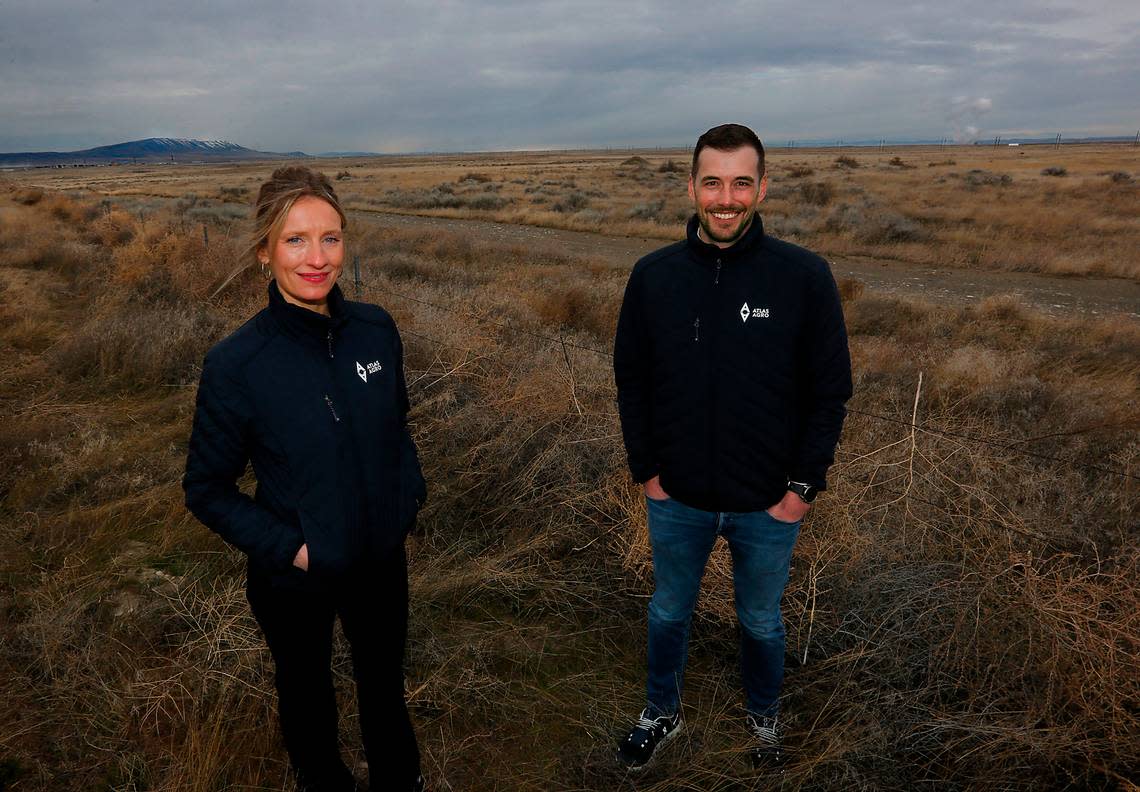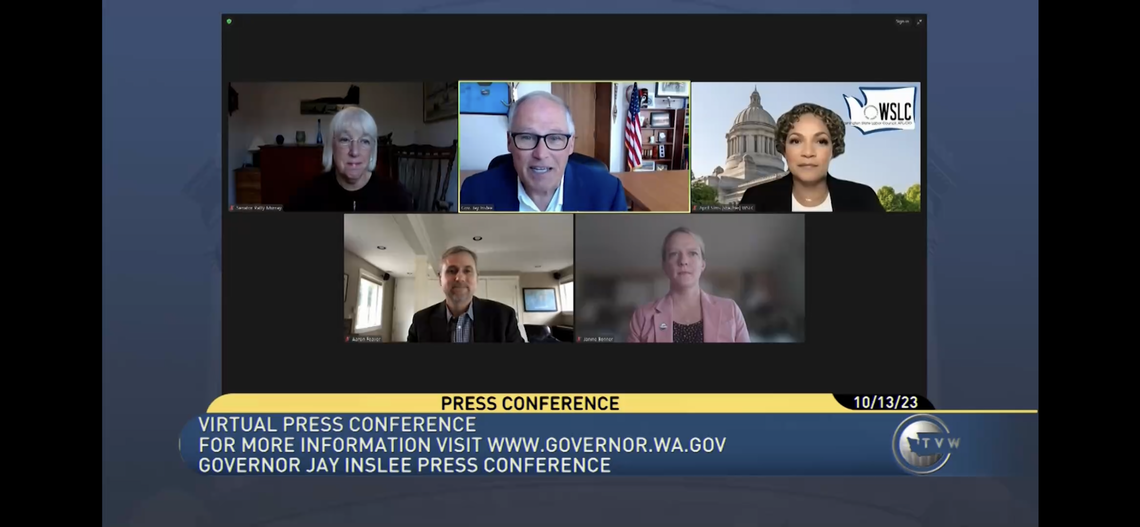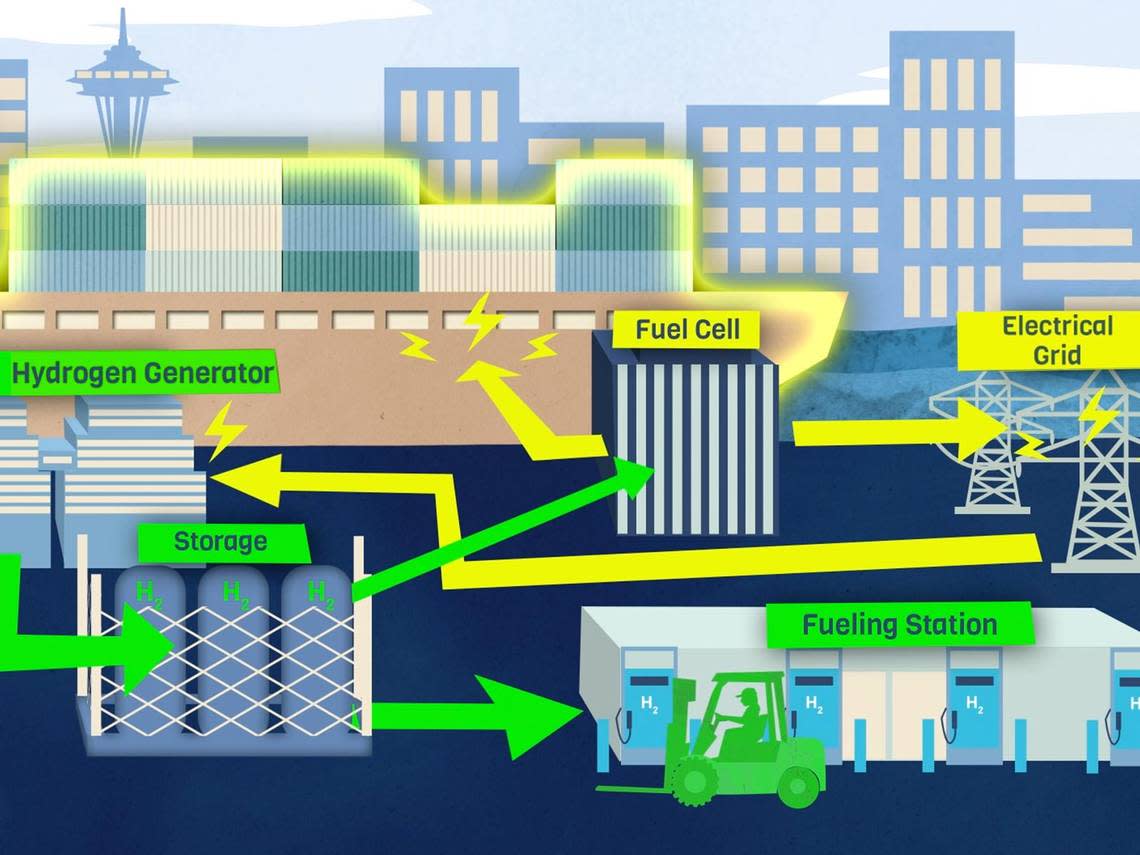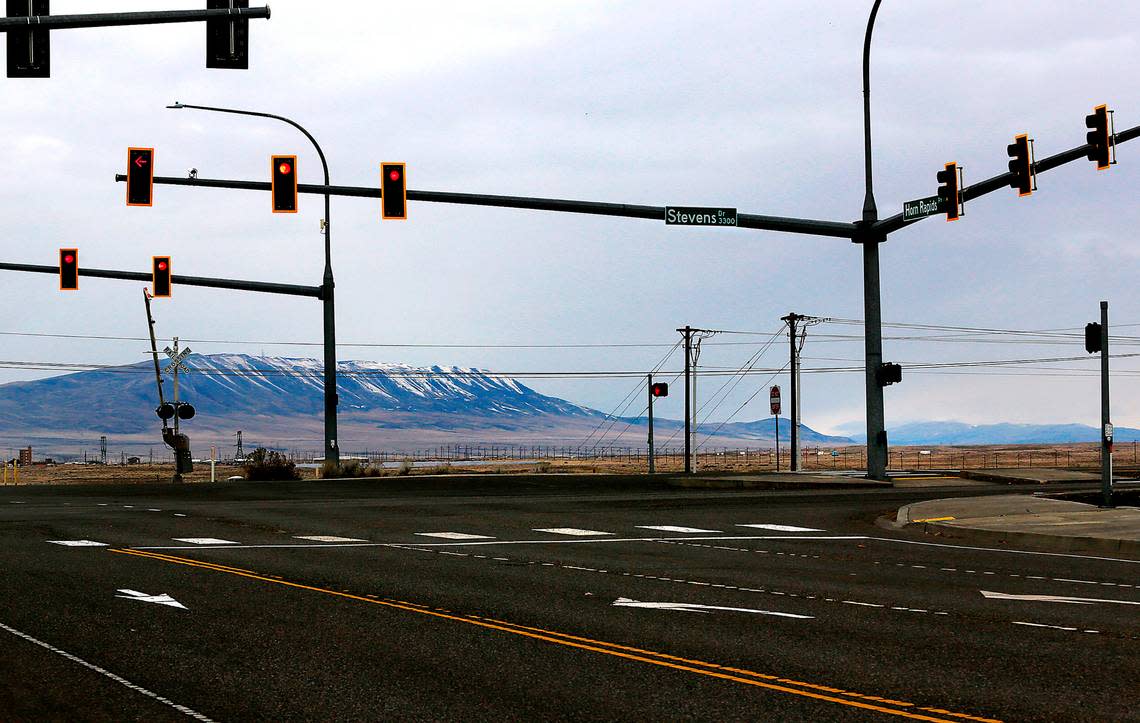Here’s how Biden’s new $7B green hydrogen investment will benefit the Tri-Cities
Green hydrogen could power development in the Tri-Cities area, including a new $1 billion, first-of-a-kind fertilizer plant in Richland, with Pacific Northwest National Laboratory in Richland providing technology expertise.
A hydrogen project also is proposed for Boardman, Ore., just across the Columbia River from Benton County, but specifics were not disclosed by an Oregon state official on a Friday news media call.
Friday the Department of Energy announced that Pacific Northwest Hydrogen Association’s PNWH2 Hub had been selected as one of the nation’s Regional Clean Hydrogen Hubs in a competitive national process with dozens of applicants.
It will be one of seven hubs nationwide that the Biden Administration will spend $7 billion to launch, with that taxpayer investment expected to leverage more than $40 billion in private investment and create tens of thousands of good-paying jobs.
Up to $1 billion over nine years could go to projects in Washington, Oregon and Montana. The Northwest hub is expected to create more than 10,000 direct jobs — 8,050 in construction jobs and 350 permanent jobs.

“We intend these to be good union paying jobs,” said Washington Gov. Jay Inslee. The application for the Northwest hydrogen hub insisted on project labor agreements, he said.
Engineers, manufacturing workers, construction workers and others will be needed, according to the Biden administration.
“The Pacific Northwest is now going to put to work the most ubiquitous element in the universe, which is hydrogen, to create the most possible jobs from any source of energy ever, potentially,” said Washington Gov. Jay Inslee.
DOE calls the clean energy initiative, part of Biden’s Investing in America agenda, one of the largest investments in clean energy and jobs in history.
“We’re talking about a billion — with a b — a billion dollar award for the Pacific Northwest,” said Sen. Patty Murray, D-Wash., chair of the Senate Appropriations Committee. “That is a huge deal.”
Washington state well positioned
The Pacific Northwest hub will make sure that Washington plays a leading role in accelerating the commercial scale development of clean hydrogen, which will speed up decarbonization efforts, and cut green house gas pollution in the region, she said.
“Washington has come out on top in this highly competitive billion dollar federal award because we’ve been innovating and collaborating on clean energy technology for decades,” said Sen. Maria Cantwell, D-Wash, chair of the Senate Committee on Commerce, Science and Transportation.
“What makes our region an ideal place for a clean hydrogen hub is that we have pioneering researchers, talented workers and $8 billion in financial commitments to produce, transport and use this promising new fuel,” said Sen. Maria Cantwell, D-Wash, chair of the Senate Committee on Commerce, Science and Transportation.
Murray and Cantwell worked to convince Energy Secretary Jennifer Granholm that Washington was the right place for a clean hydrogen hub.

Cantwell said that the three-state region was the ideal place for the project because of its “pioneering researchers, talented workers and $8 billion in financial commitments to produce, transport and use this promising new fuel.”
“The hub is designed to prove that hydrogen can drive down costs and reduce emissions in aviation, maritime and manufacturing sectors that employ thousands of Washingtonians,” she said.
The Pacific Northwest Hydrogen Association will be able to build out a network of hydrogen suppliers and users in both Eastern and Western Washington, according to information from both senators’ offices.
PNNL to evaluate impacts
The new hub will demonstrate the region’s ability to produce, process, deliver, store and use green hydrogen and serve as a national model for the creation of an affordable and self-sustaining green hydrogen economy, they said.
Renewable and abundant hydropower will be harnessed to produce hydrogen, creating the greenest hydrogen in the nation, they said.
Green hydrogen is produced by using electricity from a clean energy source to split water into oxygen and hydrogen, with the hydrogen used as fuel.
“It’s important to evaluate the carbon impact of hydrogen production from the moment it’s produced to the moment it’s use, or what’s called cradle-to-grave emissions,” said Daniel Gaspar, a PNNL chemist who serves as a senior technical adviser to the Northwest hub.

PNNL is helping the Pacific Northwest projects determine their life-cycle impacts, including a framework to measure other impacts besides greenhouse gas emissions.
PNNL experts are also providing economic analyses and evaluations of hydrogen production, integration with the electrical grid and other areas as the region builds out a clean hydrogen economy.
“We are fortunate to be able to leverage existing clean, renewable electric power in the Pacific Northwest to produce hydrogen at scale,” Gaspar said.
The Pacific Northwest has one of the cleanest power grids in the world and has made strong progress to move toward electric vehicles that use that power, said Aaron Feaver of the Joint Center for Deployment and Research in Earth Abundant Materials, or JCDREAM.
But it still has difficult de-carbonization challenges, he said.
Richland fertilizer plant
The hub will go after those areas difficult to de-carbonize, such as aviation, heavy industrial processes and fertilizer production, Inslee said.
Making green fertilizer in a clean industrial process, as is proposed in the Tri-Cities, has an enormous potential to help the agricultural economy as well as reduce climate change gases, he said.
The Atlas Agro Richland fertilizer plant is among 17 projects proposed as part of the PNWH2 Hub in the Pacific Northwest.

DOE and the Pacific Northwest Hydrogen Association will negotiate the final funding and scope for the hub beginning this fall.
The first phase of the project will include providing assurance to DOE that proposed projects are technologically, financially and legally viable and have support from their communities.
The goal is to accelerate the commercial-scale deployment of clean hydrogen, according to the Pacific Northwest Hydrogen Association.
Hubs are intended to help generate clean power, create a new form of energy storage and decarbonize heavy industry and transportation.
Atlas Agro is proposing the world’s first commercial-scale green fertilizer plant at a 150-acre site at Stevens Drive and Horn Rapids Road, near Pacific Northwest National Laboratory, in Richland.
It has entered a $9.1 million purchase and sale agreement with the Port of Benton for the land. Once part of the Hanford nuclear reservation site, the land, which was never directly used for Hanford’s mission of weapons plutonium production, was turned over to the Tri-Cities community as surplus.
The project will require up to 350 megawatts of power, or the equivalent of the power needed for 132,000 homes.
The company has completed a feasibility study and is now working on engineering and design.
Atlas Agro told the Tri-City Herald that its project will both generate and use green hydrogen in the production of zero-carbon nitrogen fertilizer.
“The project will help the Tri-Cities continue to be at the forefront of clean energy and innovation,” said Karl Dye, president of the Tri-City Development Council.
3.3M tons of clean hydrogen
The 17 Northwest projects that will be considered as negotiations open include, in addition to Atlas Agro and a potential Amazon project, are: Air Liquide Hydrogen Energy, ALA Renewable Energy, Centralia College, Mitsubishi Power Americas, Inc, Northwest Seaport Alliance, NovoHydrogen Development, PACCAR, Portland General Electric Co., Puget Sound Energy, PUD No. 1 of Douglas County, Regis Solar, First Mode, Twin Transit, USA Fortescue Future Industries, and Williams Field Services Group.
Washington State University Tri-Cities will lead the community benefits plan for the Northwest hydrogen hub.
Together the seven clean hydrogen hubs across the nation could produce more than 3.3 million tons of clean hydrogen per year, according to the Biden administration.
That would eliminate annually 25 million metric tons of carbon dioxide emissions by users of the clean hydrogen, which is equivalent to the emissions of 5.5 million gasoline-powered cars.
“This hub will be another example that the transition to all renewable energy is not only saving our planet but contributing to robust economic growth,” Inslee said.
The Pacific Northwest Hydrogen Association is governed by a board that includes public and private sector leaders, tribes, utilities, labor and environmental representatives. The association’s hydrogen hub’s proposal was supported by the state governments of Washington and Oregon.
